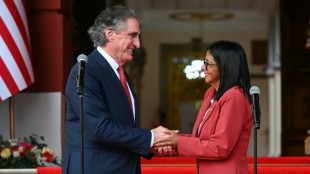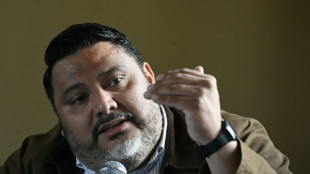-
 Iran missile barrage sparks explosions over Tel Aviv
Iran missile barrage sparks explosions over Tel Aviv
-
US says Venezuela to protect mining firms as diplomatic ties restored

-
 Trump honors Messi and MLS Cup champion Miami teammates
Trump honors Messi and MLS Cup champion Miami teammates
-
Dismal Spurs can still avoid relegation vows Tudor

-
 Berger sets early pace at Arnold Palmer with 'unbelievable' 63
Berger sets early pace at Arnold Palmer with 'unbelievable' 63
-
Morocco part company with coach Regragui as World Cup looms

-
 Lens beat Lyon on penalties to reach French Cup semis
Lens beat Lyon on penalties to reach French Cup semis
-
El Salvador's Bukele holding dozens of political prisoners: rights group

-
 With Iran war, US goes it alone like never before
With Iran war, US goes it alone like never before
-
Spurs slip deeper into relegation trouble after loss to Palace

-
 European, US stocks back in sell-off mode as oil prices surge
European, US stocks back in sell-off mode as oil prices surge
-
Pete Hegseth: Trump's Iran war attack dog

-
 Celtics' Tatum could make injury return on Friday
Celtics' Tatum could make injury return on Friday
-
'Enemy at home': Iranian authorities tighten grip as war rages

-
 Bethell set for 'hell of a career', says England captain Brook
Bethell set for 'hell of a career', says England captain Brook
-
France coach Galthie slams Scotland for 'smallest changing room in the world'

-
 Medvedev arrives in Indian Wells after being stranded in Dubai
Medvedev arrives in Indian Wells after being stranded in Dubai
-
Trump fires homeland security chief Kristi Noem

-
 Mideast war risks pulling more in as conflict boils over
Mideast war risks pulling more in as conflict boils over
-
Wales' James Botham 'sledged' by grandfather Ian Botham after Six Nations error

-
 India hero Samson eyes 'one more' big knock in T20 World Cup final
India hero Samson eyes 'one more' big knock in T20 World Cup final
-
Britney Spears detained on suspicion of driving while intoxicated

-
 Grooming makes Crufts debut as UK dog show widens offer
Grooming makes Crufts debut as UK dog show widens offer
-
Townsend insists Scots' focus solely on France not Six Nations title race

-
 UK sends more fighter jets to Gulf: PM
UK sends more fighter jets to Gulf: PM
-
EU to ban plant-based 'bacon' but veggie 'burgers' survive chop

-
 Leagues Cup to hold matches in Mexico for first time
Leagues Cup to hold matches in Mexico for first time
-
India reach T20 World Cup final after England fail in epic chase

-
 Conservative Anglicans press opposition to Church's first woman leader
Conservative Anglicans press opposition to Church's first woman leader
-
Iran players sing anthem and salute at Women's Asian Cup

-
 India beat England in high-scoring T20 World Cup semi-final
India beat England in high-scoring T20 World Cup semi-final
-
Mideast war traps 20,000 seafarers, 15,000 cruise passengers in Gulf

-
 Italy bring back Brex to face England
Italy bring back Brex to face England
-
French policeman to be tried over 2023 killing of teen

-
 Oil prices rise, stocks slide as Middle East war stirs supply concerns
Oil prices rise, stocks slide as Middle East war stirs supply concerns
-
More flights take off despite continued fighting in Middle East

-
 Ukraine, Russia free 200 POWs each
Ukraine, Russia free 200 POWs each
-
Middle East war halts work at WHO's Dubai emergency hub

-
 Paramount's Ellison vows CNN editorial independence
Paramount's Ellison vows CNN editorial independence
-
US says attacks on alleged drug boats have spooked traffickers

-
 Dempsey returns as Scotland shuffle pack for Six Nations clash against France
Dempsey returns as Scotland shuffle pack for Six Nations clash against France
-
India pile up 253-7 against England in T20 World Cup semi-final

-
 Wary Europeans pledge 'defensive' military aid in Mideast war
Wary Europeans pledge 'defensive' military aid in Mideast war
-
Seven countries to boycott Paralympics ceremony over Russia: organisers

-
 UK's Crufts dog show opens with growing global appeal
UK's Crufts dog show opens with growing global appeal
-
PSG prepare for Chelsea clash with Monaco rematch

-
 Google opens AI centre as Berlin defends US tech reliance
Google opens AI centre as Berlin defends US tech reliance
-
Second Iranian ship nears Sri Lanka after submarine attack

-
 Portugal mourns acclaimed writer Antonio Lobo Antunes
Portugal mourns acclaimed writer Antonio Lobo Antunes
-
Union loses fight against Tesla at German factory

DOGE Fails to Slash U.S. Spending
The Department of Government Efficiency (DOGE), launched with bold promises to revolutionize federal spending, has fallen dramatically short of its ambitious goals, raising questions about its effectiveness and impact on the U.S. budget. Tasked with streamlining government operations and slashing what its proponents called wasteful expenditure, DOGE was heralded as a transformative force. Yet, recent developments reveal a stark reality: the initiative has failed to deliver meaningful spending cuts, leaving its lofty objectives unfulfilled and critics pointing to mismanagement and inflated claims.
Initially, DOGE set out with a headline-grabbing target of reducing federal spending by $2 trillion, a figure that captured public attention and underscored the initiative’s audacious vision. This goal was later halved to $1 trillion, signaling early challenges in identifying viable cuts without disrupting essential services. More recently, reports indicate that the projected savings have dwindled to a fraction of the original promise, with estimates suggesting only $150 billion in reductions—a mere 7.5% of the initial target. Even this figure has faced scrutiny, with analysts arguing that the actual savings may be significantly lower due to questionable accounting methods and speculative projections.
One of the core issues plaguing DOGE has been its approach to identifying efficiencies. The initiative aimed to eliminate redundant contracts, streamline federal agencies, and reduce bureaucratic overhead. However, the execution has been chaotic, with cuts often appearing indiscriminate rather than strategic. For instance, reductions in consulting contracts, particularly in defense and IT services, were touted as major wins, yet many of these contracts supported critical government functions. The abrupt termination of such agreements has led to operational disruptions, forcing agencies to scramble for alternatives or reinstate services at additional cost.
Moreover, DOGE’s efforts have sparked unintended consequences across federal agencies. Staff reductions, intended to shrink the workforce, have instead triggered inefficiencies, with remaining employees struggling to handle increased workloads. This has been particularly evident in agencies responsible for public services, where understaffing has led to delays and diminished service quality. The ripple effects extend beyond government operations, impacting private-sector contractors who relied on federal partnerships. Layoffs in consulting firms and other industries tied to government contracts have further eroded confidence in DOGE’s strategy.
Critics argue that DOGE’s aggressive push for cuts overlooked the complexity of federal budgeting. Many targeted programs, such as grants for cultural institutions or international development, represent a tiny fraction of the budget but deliver outsized benefits in terms of public goodwill and long-term economic gains. Eliminating these programs has yielded negligible savings while generating significant backlash. Similarly, attempts to overhaul agencies like the Social Security Administration have raised alarms about potential disruptions to benefits, undermining public trust in the initiative’s priorities.
The leadership behind DOGE has also come under fire. High-profile figures driving the initiative were expected to bring private-sector ingenuity to government reform. Instead, their lack of experience in public administration has led to missteps, including overestimating the ease of implementing cuts and underestimating the resistance from entrenched bureaucratic systems. Public perception has soured as well, with polls indicating growing skepticism about DOGE’s ability to deliver on its promises without harming essential services.
Financially, the broader context paints a grim picture. While DOGE aimed to curb deficits, the federal debt continues to climb, projected to exceed $36 trillion in the coming years. Tax cuts passed concurrently with DOGE’s efforts are expected to add trillions more to the deficit, offsetting any savings the initiative might achieve. This contradiction has fueled accusations that DOGE was more about political optics than genuine fiscal responsibility.
Looking ahead, DOGE’s future remains uncertain. With its initial timeline nearing its end, pressure is mounting to demonstrate tangible results. Supporters argue that the initiative has at least sparked a conversation about government waste, laying the groundwork for future reforms. However, without a clear pivot to more targeted, evidence-based strategies, DOGE risks being remembered as a cautionary tale of overambition and underdelivery.
In the end, the Department of Government Efficiency has not lived up to its billing as a budget-cutting juggernaut. Its inability to achieve meaningful spending reductions, coupled with operational missteps and public skepticism, underscores the challenges of reforming a sprawling federal system. As the U.S. grapples with fiscal challenges, the DOGE experiment serves as a reminder that bold promises must be matched by careful execution.

Ukraine: Recruiters searched Kyiv venues

EU: Austrian elections shake Establishment

Terrorist state Iran: ‘We are ready to attack Israel again’

EU: Greenpeace warns of dying farms

EU: Tariffs on all Chinese electric Cars

Zelenskyy: ‘What worked in Israel work also in Ukraine’

Electric car crisis: Future of a Audi plant?

Vladimir Putin, War criminal and Dictator of Russia

EU vs. Hungary: Lawsuit over ‘national sovereignty’ law

Ukraine: Zelenskyy appeals for international aid

Lebanon: Is a new wave of refugees coming to the EU?




